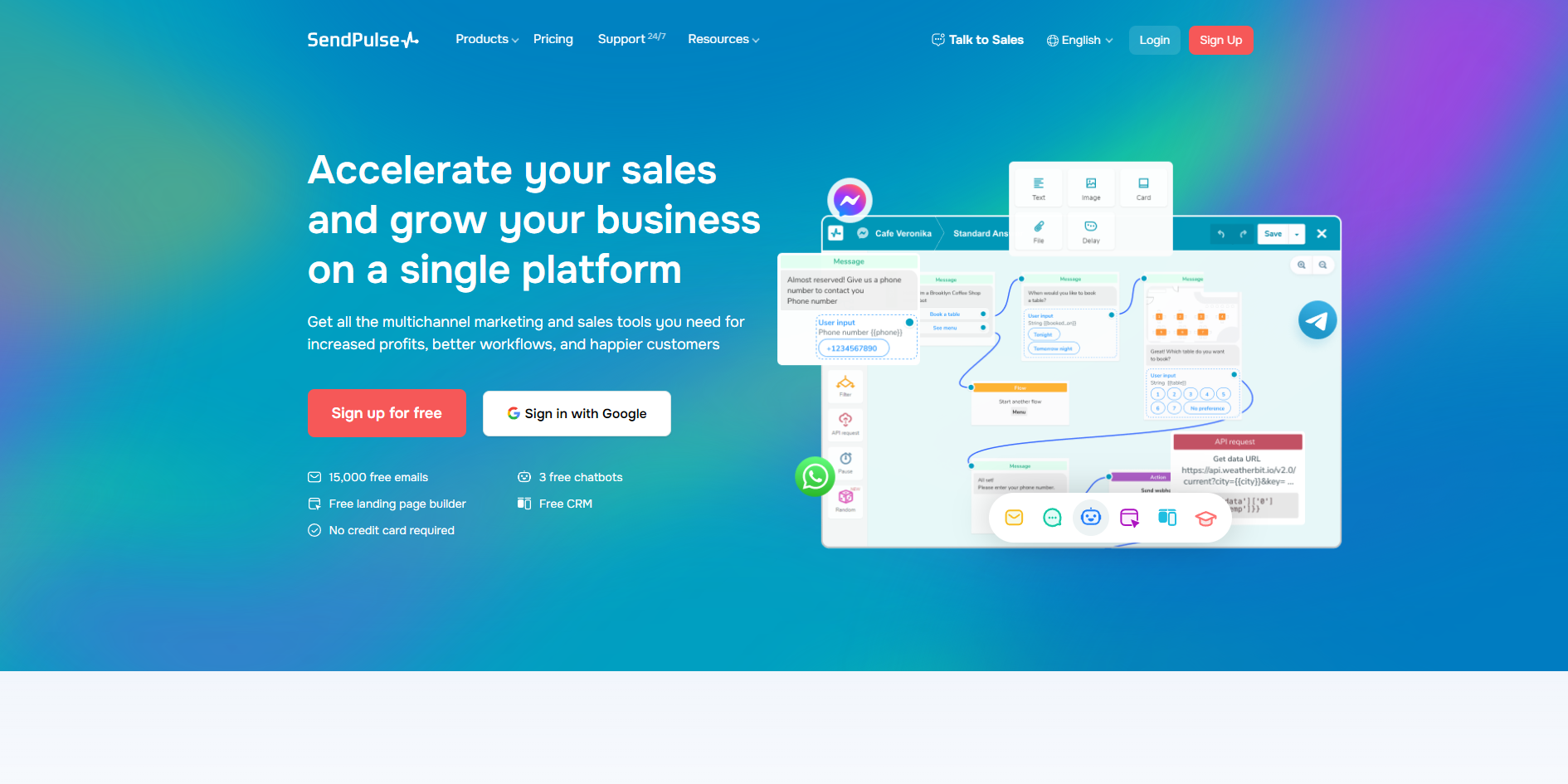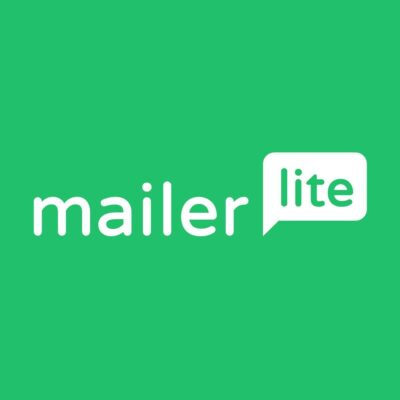AWeber is one of the most well-known email marketing platforms, used by over one million small businesses and entrepreneurs. It allows users to easily create email campaigns, build subscription forms, segment contacts, and track analytics. However, some users run into limitations with AWeber or find themselves seeking alternative options that may better suit their needs and budgets for reasons such as price, features, deliverability, and scaling options.
If that’s the case for you, this article about the 12 best AWeber alternatives is worth considering.
Brevo
Brevo has everything you need to plan, adjust, and execute your email marketing campaigns with ease
Omnisend
Omnisend is an ideal choice for eCommerce brands due to its extensive eCommerce-specific tools and features
HubSpot
HubSpot is perfect for SaaS companies due to powerful integrations with various sales-specific characteristics
ActiveCampaign
If you want to automate most or all of your email marketing campaign, ActiveCampaign is the best choice out there
MailerLite
MailerLite is a great AWeber alternative if you're a solopreneur or own a startup/small company
1. Brevo
Best Overall Aweber Alternative (Free, then $25/Month)
Brevo is a relative newcomer to the email marketing software scene that focuses on providing an easy-to-use platform tailored to solopreneurs, startups, and small teams.
With its simple drag-and-drop editor, a generous free plan, and automated features like drips and autoresponders, Brevo aims to help smaller businesses professionalize communications without investing in complex enterprise tools they may not fully utilize.
What makes Brevo a better alternative than AWeber:
- More affordable pricing tiers, starting with a free plan for up to 150 contacts
- Modern, intuitive interface that’s been designed specifically for simplicity and ease of use
- Built-in tools to help you grow your list faster like website signup forms and landing pages
- Automation features like email drips and autoresponders included even at the lowest tier
- Strong focus on deliverability through advanced methods like AI optimization and behavioral targeting
While AWeber offers a solid basic feature set, Brevo provides a comparable offering that has been purpose-built to provide an optimal experience for lean teams.
From its simple but powerful editor to advanced automation tools included for all users, Brevo aims to help small businesses punch above their weight class when it comes to email marketing sophistication. For those seeking an intuitive, affordable alternative, Brevo warrants a close look.
2. Omnisend
Best for E-Commerce Brands Who Want To Drive Repeat Purchases (Free, Then $16/Month)
Omnisend is a feature-rich email marketing platform focused specifically on meeting the unique needs of e-commerce businesses. Unlike more generalized platforms, Omnisend has been purpose-built to help online stores drive repeat purchases, boost customer lifetime value, and improve retention with targeted and automated lifecycle campaigns.
What makes Omnisend a better alternative than AWeber:
- E-commerce-specific features like abandoned cart recovery, product recommendations, and customer win-back workflows are pre-built into the platform. AWeber lacks the deep segmentation and automation required for effective e-commerce email marketing.
- Powerful segmentation capabilities allow brands to divide contacts based on criteria like purchase history, on-site behavior, order frequency, lifetime value, and more. You can then create highly targeted campaigns speaking to every subscriber’s habits.
- Advanced behavioral automation and workflows that are tailored to the e-commerce shopper lifecycle. Send cart abandonment emails, customize messaging based on products viewed, target less active subscribers with re-engagement offers, and more.
- Hundreds of professionally designed, conversion-optimized email templates created specifically for e-commerce stores across all categories. AWeber templates tend to be more generalized.
- Deep insights powered by precise purchase tracking allow hyper-customization of messaging while giving full visibility into email campaign ROI. Omnisend’s custom e-commerce reports reveal customer metrics unavailable in AWeber.
- Scalability to support the email volume needs of enterprise brands sending billions of emails annually. Omnisend was built to handle exponential growth.
While AWeber offers a solid baseline of general features, brands selling online require tools purpose-built to support e-commerce-specific email marketing use cases. From advanced segmentation to e-commerce automation and templates, Omnisend stands out as a specialized solution made for taking online stores to the next level.
3. HubSpot
Best for SaaS Companies Using HubSpot’s Sales Software (Free, Then $20/Month)
HubSpot is an all-in-one marketing software that is a popular choice for growth-stage SaaS companies. The platform includes email marketing along with a range of complementary tools to facilitate the entire marketing funnel from CRM to messaging to lead nurturing, sales enablement, and beyond.
What makes HubSpot a better alternative than AWeber:
- Seamless connections between HubSpot’s email tool and its CRM, landing page builder, forms, meetings scheduler, and more.
- Lead scoring, lead assignments, sales playbooks, and other sales features integrate directly into campaigns
- Built-in analytics connect your email performance directly to website traffic sources and real pipeline impact.
- Robust segmentation based on contact activity history across HubSpot’s tools, not just email behavior
- Educational resources, onboarding support, and a large integration marketplace as part of its ecosystem
While AWeber focuses specifically on email functionality, HubSpot takes an ecosystem approach that brings together email with CRM, lead management, and full-lifecycle marketing features. For growth-stage SaaS brands already invested in the HubSpot platform, its native email tool allows the creation of highly integrated, aligned funnel campaigns that drive pipeline in a unified system.
4. ActiveCampaign
Best for Mid-Market Companies Wanting Robust Automation ($29/Month)
ActiveCampaign markets itself as an all-in-one customer experience platform complete with email marketing, sophisticated marketing automation, CRM, messaging, sales funnel building, and more. This makes it appealing for mid-market companies looking to consolidate systems under one roof.
What makes ActiveCampaign a better alternative than AWeber:
- Highly visual campaign builder and automation workflow designer allowing the creation of complex multichannel campaigns across email, SMS, messaging apps, and more. ActiveCampaign’s robust automation capabilities outpace AWeber’s more basic offerings.
- Built-in CRM with unified customer profiles centralizing all subscriber and client information, history, and activities across channels into singular records for each contact. This provides complete visibility unable to be matched in AWeber.
- Custom lead scoring algorithms and predictive modeling capabilities leverage that unified CRM data to determine who sales should prioritize based on historical indicators of close potential.
- Over 750 native integrations with leading platforms like Shopify, WooCommerce, WordPress, Salesforce, and G Suite plus Zapier connectivity. This flexibility in connecting data ecosystems far surpasses AWeber’s comparatively paltry integration options.
- Options to scale up to enterprise-level capacity in terms of email volume as well as the number of contacts and complex automation. ActiveCampaign is built to support mid-market company growth over the long term.
While AWeber sticks to offering good enough email functionality, ActiveCampaign stretches into providing a full customer experience platform aimed at consolidating systems. For mid-market companies wanting to graduate towards more advanced automation leveraging centralized customer data, ActiveCampaign eliminates the need to piece together disparate solutions.
5. MailerLite
Best for Solopreneurs and Startups Wanting Simplicity With Room To Grow (Free, Then $10/Month)
MailerLite markets itself as a user-friendly email marketing alternative built specifically for startups, small businesses, solopreneurs, and lean teams. With an uncomplicated interface focused on ease of use plus scalable features, it aims to provide an easy on-ramp for those new to email marketing.
What makes MailerLite a better alternative than AWeber:
- One of the simplest, most intuitive user interfaces in the email platform space is specifically designed around ease-of-use principles. This makes getting started with campaigns approachable even for total beginners.
- Significantly lower pricing tiers starting with a generous free plan for up to 1,000 subscribers. This lets solo entrepreneurs and early-stage startups try advanced automation tools without upfront software costs.
- Built-in landing pages, pop-ups, and signup forms make growing lists fast and easy without new software. MailerLite aims to provide all the tools needed for lead gen and email under one roof.
- Specified features for online publishers, bloggers, artists, and creators such as RSS-to-email, blog post notifications, and built-in social sharing buttons aim to help those segments better engage their audiences.
- Renowned for providing exceptional customer support through knowledge bases, forums, live chat, and email ticketing even for users on free plans. This helps offset the platform’s steeper learning curve. The platform also provides a dedicated customer success manager for premium users.
While AWeber requires payment from all users regardless of list size, MailerLite allows the freedom to access sophisticated features free of charge initially. For solopreneurs, bootstrapped startups, and online publishers wanting uncomplicated email marketing that doesn’t break the bank, MailerLite makes the shortlist of top alternatives worth close consideration.
6. Campaigner
Best for Political Campaigns, Advocacy Groups, Nonprofits ($59/Month)
Originally started as a service catering specifically to the unique needs of political campaigns, advocacy groups, nonprofits, and cause-driven organizations, Campaigner is email marketing software purpose-built around facilitating meaningful engagement between missions and the communities that support them.
What makes Campaigner a better alternative than AWeber:
- Specialized tools for building grassroots movements like online petition forms, donation forms, event RSVPs, volunteer signup flows, and peer-to-peer messaging. This empowers supporters to easily take action and recruit friends to the cause.
- Advanced segmentation capabilities around interests, behaviors, and attributes specific to nonprofit contexts allow extremely targeted communication relevant to each subscriber’s level of engagement. You can personalize messaging in more meaningful ways.
- Compliance with complex legislation around anti-spam, privacy, and fundraising regulations is built into the platform so nonprofit users can avoid missteps. Support teams have expertise in navigation regulations.
- International nonprofit compliance standards like GDPR and CASL are also built into the software. Campaigner aims to keep political and cause-based groups operating safely so they can focus on their mission.
- The support team has a significant political campaign and nonprofit sector experience and expertise unavailable with general email platform providers.
While AWeber approaches a general audience with a blanket set of email functionality, Campaigner tailors its tools specifically to facilitating personal connections between organizations focused on public good and the communities passionate about supporting their mission.
For politically-minded groups and cause-driven nonprofits seeking specialized software and compliance expertise, Campaigner delivers legislative knowledge and purpose-built capabilities unmatched by more generic platforms.
7. BigMailer
Best for Transactional and Bulk Emailers Focused on Deliverability (Free, Then $5/Month)
BigMailer positions itself as a high-volume email service and deliverability provider engineered specifically for professional communicators with demanding send capacity, redundancy, and inbox placement needs far surpassing consumer-grade platforms like AWeber.
What makes BigMailer a better alternative than AWeber:
- Proprietary software algorithms track over 100 metrics around campaigns and infrastructure to optimize message factors and routing for maximizing inbox placement and open rates. Deliverability optimization is automated and ongoing.
- Advanced list cleansing and bounce handling with customized retry logic, scheduled sending, and subscriber quarantines provide granular control over how different segments are re-engaged to improve deliverability.
- Volume pricing tiers and options scale up to billions of emails monthly to meet the bursting needs of transactional emailers. AWeber caps plans at a fraction of this capacity.
- Dedicated IP addresses ensure the sender’s reputation stays isolated from other customers so one bad actor can’t jeopardize your deliverability. This level of environment customization is unavailable with AWeber.
- Infrastructure and architecture purpose-built to prioritize large bursting campaign loads so customers can trust their time-sensitive communications will hit the inbox without delay at send time.
For professional communicators dependent on email reliability for high-stakes campaigns, BigMailer merits deeper investigation as an enterprise-grade alternative engineered specifically for demanding volume, deliverability, customization, and redundancy needs unable to be satisfied by consumer-tier solutions.
8. Constant Contact
Best for Small Businesses Wanting Simplicity With Marketing Automation (Free Trial, Then $12/Month)
Constant Contact markets itself as an approachable, easy-to-use email marketing platform built specifically for small business owners, entrepreneurs, solopreneurs, and lean teams. With straightforward tools combined with introductory automation features, it aims to provide an all-in-one coordinated marketing solution.
What makes Constant Contact a better alternative than AWeber:
- One of the simplest drag-and-drop email editor interfaces on the market, specifically focused on small business user ease and approachability. Minimizes complexity.
- Budget-friendly pricing plans with basic automation tools like autoresponders, sign-up forms, and multi-email workflows aim to be accessible for small marketing budgets.
- Social media publishing and analytics features allow connecting email to Facebook and Instagram without needing additional software. This consolidated toolset saves costs.
- Pay-as-you-go credits option available without requiring an ongoing monthly subscription. This offers flexibility for seasonal businesses.
- Renowned for strong customer support offerings like 24/7 phone access, one-on-one training, and U.S.-based service teams. This is vital for less experienced users.
While AWeber offers a comparable core feature set, Constant Contact’s specialized focus on simplifying email marketing for entry-level small business users makes it a frequent contender among top alternative lists.
For solopreneurs and entrepreneurial teams wanting straightforward tools strengthened by basic automation capabilities, Constant Contact aims to provide an accessible jumping-off point into coordinated multi-channel marketing.
9. SendPulse
Best for Marketers Wanting Email Combined With Messaging Channels (Free Plan, then $8/Month)

SendPulse is a multipurpose digital marketing platform built around robust email marketing tools as well as additional integrated communication channels like SMS text messaging, voice calls, unlimited web push notifications, Telegram, Facebook Messenger, Viber, and more.
What makes SendPulse a better alternative than AWeber:
- Support for SMS, voice calls, web push, Telegram, Facebook Messenger, Viber, and other avenues beyond email allows coordinating multi-channel campaigns to customers from one unified experience instead of multiple platforms.
- Built-in website pop-ups, live chat features, and lead generation chatbots provide additional tools to capture and engage visitors that integrate directly with central subscriber profiles and email lists for immediate personalized follow-up across channels.
- Full webinar hosting and broadcasting functionality built right into the platform expands options alongside traditional email newsletters to nurture audiences through more immersive experiences.
- A generous free plan option plus lower pricing tiers overall than most comparable multi-channel marketing platforms and even many pureplay email competitors. This makes robust features more accessible.
- Higher monthly sending limits than AWeber at comparable lower pricing tiers make scaling less costly as needs grow. Less recourse to upgrade plans.
While AWeber focuses purely on core email newsletter and automation features in isolation, this email marketing tool expands capabilities significantly by integrating multiple avenues of communication into a cohesive, unified experience.
For digital marketers wanting increased flexibility to coordinate emails with SMS messaging, automated messaging apps, web push, and more, SendPulse aims to provide an omnichannel martech solution.
10. GetResponse
Best for E-Commerce Brands Wanting Marketing Automation (Free, Then $15.60/Month)
GetResponse markets itself as an all-in-one email marketing platform made specifically for e-commerce brands – combining professional email capabilities with sophisticated behavioral automation, landing pages, forms, SMS, and more to help drive repeat purchases and maximize customer lifetime value.
What makes GetResponse a better alternative than AWeber:
- Tight shopping cart integrations and granular contact segmentation allow dividing customers based on detailed purchase activity, order history, browsing behavior, product affinity, order frequency, customer lifetime value, and more for hyper-targeted communications.
- Pre-built automation for cart abandonment recovery, re-engaging less active contacts, triggering post-purchase review requests, personalized product recommendations, and ongoing lifecycle touchpoints optimized to e-commerce buyer journeys.
- Advanced features like SMS marketing, webinars, customizable landing pages, contact forms, and lead generation capabilities expand features beyond basic email newsletters to support sales processes.
- Generous free trial provides access to a wider array of features including automation and webinars that have additional costs even on AWeber’s trial.
- Hundreds of professionally designed email templates and themes focused specifically around e-commerce sales use cases like promotions, product launches, announcements and more provide added value out of the box.
With shopping cart connectors and tools tailored specifically to meet the email marketing automation needs of product brands, GetResponse delivers e-commerce-specific capabilities unmatched by AWeber’s more generalized approach.
From product recommendations to customer re-engagement and detailed purchase behavior tracking, GetResponse aims to power repeat business through behavioral email.
11. Benchmark Email
Best for Large Email Senders Prioritizing Deliverability (Free Plan, Then $13/Month)
Benchmark Email is an enterprise-grade email service and deliverability provider catering specifically to power senders with extremely high-volume distribution needs that far surpass consumer solutions like AWeber.
With a strong specialized focus on maximizing email campaigns’ inbox placement through advanced and dedicated deliverability engineering, Benchmark Email aims to serve organizations dependent on email delivery for core operations.
What makes Benchmark Email a better alternative to AWeber:
- Sophisticated deliverability optimization tools like automated IP warming routines, advanced domain authentication, mailbox provider whitelist services, spam testing, reverse DNS configuration, and granular analytics provide enhanced visibility and control over placement.
- Dedicated IP addresses isolate senders’ reputations from other customers for improved consistency, while further isolation options contain issues should they arise so deliverability stays protected.
- Scales up to send billions of emails monthly through extensive proprietary infrastructure to meet the bursting distribution spikes common amongst enterprise transactional communicators and global e-commerce powerhouses.
- Advanced scheduling, visual campaign building, dynamic sender profiling, grouping, segmentation, and A/B testing features help manage sophistication at scale.
- Pay-as-you-go pricing works well for businesses with major seasonal spikes or fluctuations needing added flexibility. Month-to-month commitments aren’t forced.
With an intensive focus on maximizing email deliverability through extensive proprietary IP assets, customization, redundancy, scalability, and advanced inbox placement science unavailable to consumer platforms, Benchmark Email differentiates itself as an enterprise-grade email distribution specialist for send-dependent organizations sending at tremendous volumes.
12. Moosend
Best for E-Commerce Email and SMS Marketing (Free 30-Day Trial, then $9/Month)
Moosend is an email and SMS marketing platform built around catering specifically to e-commerce businesses by helping online stores drive repeat purchases and maximize customer lifetime value through targeted post-purchase automation, abandoned cart savings, personalized product recommendations, and consistent lifecycle messaging.
What makes Moosend a better alternative than AWeber:
- Advanced integrations with platforms like Shopify and WooCommerce to track contacts’ on-site behaviors to trigger hyper-personalized product suggestions, cart recovery offers, and behavioral messaging designed to nurture continued buying.
- Segmentation offerings allow dividing customers based on granular properties pulled from integrated stores such as order history, average purchase value, browsing activity, time from last order placed, product categories viewed, and recent purchases to deploy ultra-tailored communications.
- Pre-built lifecycle automation for cart abandonment recovery, post-purchase review requests, re-engaging dormant contacts, birthday promotions, and holiday-centric campaigns make e-commerce email marketing more turnkey.
- SMS capabilities are included alongside email for important customer triggering like shipping confirmations and delivery updates. Additional SMS-specific lifecycle campaigns nurture subscribers through text messages as well.
- A generous free plan and a higher number of included contacts on entry-paid tiers compared to competing e-commerce-focused email platforms help enable sophisticated capabilities even for cost-conscious stores.
With tools purpose-built around helping online retailers leverage behavioral data to turn one-time buyers into loyal repeat customers through personalized, sequenced messaging, Moosend differentiates itself from generalized solutions providers like AWeber in the e-commerce space. For any merchant seeking to maximize LTV, Moosend deserves consideration.
Features to Consider For an Aweber Alternative
1. Ease of Use
Ease of use should be a top consideration when evaluating AWeber alternatives because email marketing tools often fail when platforms are too complex for customers to reasonably leverage.
If creating campaigns, building forms, segmenting contacts and managing reports feel technical, convoluted, and frustrating, it mars the entire user experience. This means an intuitive, beginner-friendly interface design focused specifically on simplicity and approachability should rank highly in buying criteria.
The best AWeber alternative email providers aim for users to not just be able to functionally access features but to enjoy using their tools through thoughtful workflow design, smart functional visuals, and an experience optimized to feel effortless.
Look for drag-and-drop editors, step-based wizards guiding you through creation processes, hover-over tooltips explaining settings, and uncluttered screen real estate avoiding feature overload. Considering ease of use helps ensure your team will fully leverage the platform’s capabilities with a smile.
2. Design and Customization
Design and customization capabilities should also factor prominently into AWeber alternative considerations because email creative significantly impacts engagement rates, which correlate directly to sales and revenue.
If your platform limits branding flexibility or forces a one-size-fits-all aesthetic, it hamstrings your efforts out of the gate. Effective email marketing requires matching messaging tone, visual identity, and customization to your specific audience.
When comparing the design toolsets among AWeber alternatives, ensure the platform offers ample templates catered to your industry vertical and campaign goals so you can minimize starting from absolute scratch every send.
But custom branding flexibility layered on top of those templates proves equally key so your communications feel aligned with your company’s visual identity. Drag-andable design settings empowering easy resizing, photo editing, color selection, and content tweaks should be expected table stakes.
Prioritizing design and customization support helps guarantee your hard work crafting strategic emails pays off through engagement.
3. Blogging Tools
Integrated blogging features should also make the priority list for evaluating AWeber alternatives if you currently operate, or hope to operate, a business blog on your website to drive traffic and subscribers. Email often functions as the main avenue for distributing blog content updates to readers. But manually copy-pasting articles into newsletters proves inefficient.
Seeking out email marketing platforms with built-in blog integration that automatically capture new posts and allow creating notification emails, blog digest campaigns, customizable RSS feeds and more can provide tremendous time savings while also fostering stickiness through content relationships with your audience.
For bloggers specifically, but even general business websites with content libraries, assessing available blogging tools merits strong consideration before committing to an AWeber alternative to ensure alignment with content promotion needs down the road. Identifying platforms capable of directly leveraging your thought leadership to nurture your email list provides strong synergy.
4. E-commerce Capabilities
For online stores and other product-selling businesses comparing the best AWeber alternatives, e-commerce-specific email marketing capabilities deserve priority consideration within decision criteria because leveraging purchase behaviors and browsing trends can have an outsized impact on repeat sales and maximizing customer lifetime value.
If your platform cannot segment contacts based on granular on-site behaviors, trigger personalized product recommendations, or encourage second purchases through post-purchase nudges, you leave money on the table.
Assessing the e-commerce functionality gap between generalized list-building solutions and platforms purpose-built with shopping cart integration, conversion-focused templates, automated flows for abandoned cart saving and re-engagement, and customer win-back programs tailored to the buyer lifecycle can determine whether or not your efforts achieve ROI.
Prioritizing tools that empower targeted, behavior-based communications to nurture existing customers often generates better returns than solely chasing new leads. For e-commerce brands, specialized shopping functionality merits weight in seeking AWeber alternative providers potentially better optimized for merchandisers’ unique needs.
5. SEO Tools
Evaluating available SEO tools merits strong consideration when seeking the best AWeber alternative solution if your business depends on organic discovery to fuel subscriber growth. Email marketing and SEO initiatives share significant synergy when executed in alignment.
As potential customers discover your brand through search engines and content, they grow more receptive to direct outreach and promotions.
Certain email marketing platforms better support marrying email efforts to SEO through alt text tagging to images for improving accessibility, tools for highlighting key industry keywords within messages, unfurling features that preview content in search results for improved click-through rates, metadata optimization, and even link building automation reinforcing relevance indexes.
Vetting solutions on SEO email support and confirmation that messages facilitate indexed reach for extended discovery can directly impact audience building for non-paid media channels. The more an AWeber alternative facilitates search alignment, the more value gets derived from high-production newsletters by amplifying their visibility and shelf life.
6. Integrations
Assessing the integration ecosystems available with different AWeber alternative providers proves critically important for most businesses because marketing stacks always expand as needs grow more sophisticated.
Being restricted to an isolated platform incapable of surfacing data from your CRM, connecting campaign performance to your analytics suite, sharing assets across social media ads managers, or even syncing subscriber activity on your website limits potential.
Before committing, research what types of platforms, tools, and databases each alternative solution plays friendly with out of the box. More integrations translate to flexibility as your martech needs advance across departments.
Native connections avoid manual workflows or lost visibility by enabling unified systems that share key performance indicators and surface insights in a centralized dashboard. And robust email marketing automation functionality allowing apps and platforms to pass data back and forth multiplies possibilities exponentially. Choosing AWeber alternatives with vast integration potential futureproofs your expansion options.
7. Analytics and Reporting
Sophisticated analytics and reporting capabilities deserve heavy weighting when comparing AWeber competitors because identifying what’s working and what requires optimization remains imperative for continual email program improvement driving revenue.
If an alternative’s baked-in analytics fail to provide a holistic, visually compelling overview and drill-down visibility into critical key performance indicators, you fly blind.
Assessing the depth and functionality of self-serve reporting dashboards allows confirmation that the platform tracks essential metrics like deliverability rates, open and click-through ratios, conversation metrics, engagement over time, and audience segmentation analysis essential for monitoring campaign health.
Comparing capabilities in data exports, custom reporting builds, sharing options and even AI insights can determine whether your team will be empowered to extract intelligence-guiding decisions. With email marketing ROI depending deeply on continual testing and improvement, analytics prowess should direct alternative evaluations.
8. Customer Support and Community
The type, availability, and responsiveness of customer support should strongly factor when weighing AWeber alternatives because email marketing platforms often require troubleshooting complex deliverability issues, deciphering the origins of suppressed engagement metrics, and simply learning how to properly configure an array of sophisticated capabilities.
If a provider fails to offer sufficient self-help resources coupled with attentive human assistance through preferred contact channels as needed, users risk feeling stranded.
Vet each platform’s support offerings including thorough documentation, tutorials, chat/phone/ticketing access to staff, peer community forums facilitating discussions between customers, and even complimentary specialized onboarding assistance for larger accounts. Considering if an alternative provider actively monitors social media and helps publicly may reveal response prioritization.
Confirm second-level technical experts backing general agents for best results overcoming hurdles. With email marketing remaining relatively high-touch, support commitments sway buying power.
9. Pricing
Pricing deserves careful inspection when evaluating AWeber alternatives because email marketing solution costs directly factor into marketing budgeting capabilities across departments for most small and midsize businesses. What appears affordable month-to-month may limit sending capacity, force added fees as lists scale, restrict access to essential tools like automation, or lead to unexpected renewal spikes. Always model out total potential expenses mapping software tier allowances to projected contact volumes over 12-24 months.
Factor associated pricing around additional contacts, email sends beyond monthly allotments, SMS capabilities or integrations if applicable, and retention incentives rewarding loyalty across years instead of mere month-to-month commitments when comparing solutions.
Support specialization, access restrictions between tiers, and the balance of features relative to competitors at each price point should enlighten cost decisions as well.
With reputations and considerable investments riding on email consistency, factoring overall value against reliable performance and business flexibility drives the best bang for your buck across AWeber alternatives vying for your budget.
10. Reviews and Reputation
The reviews, ratings, complaints, and overall reputation each AWeber alternative manages across consumer sites, forums, Reddit, TrustPilot, G2, and others should carry meaningful weight in evaluations because real-world feedback directly from current and past users provides helpful unfiltered insights into provider’s strengths, weaknesses and service track record supplementing promotional promises.
By scanning publicly visible perceptions across the internet as well as contacting acquaintances already using your top contenders for candid thoughts, you gain credible perspectives.
Consider specifically seeking out customer commentary around factors directly affecting key email KPIs like deliverability consistency, engaging template design, ease of use for non-technical staff, helpfulness in meeting unique use cases beyond generalizations, the quality of customer support for overcoming hurdles, as well as visible leadership following through on roadmap promises over time.
Favor alternatives enjoying vocal advocates over ones drawing substantial complaints and controversy. While no platform satisfies every user, assessing honest satisfaction gets at reliability and fit.
Summary and Top Picks
While AWeber deserves its popularity as a longtime email marketing leader offering a solid set of baseline capabilities, the platform’s limitations around affordability, advanced functionality, deliverability optimizations, and e-commerce specialization leave plenty of room for alternative solutions to competitively fill gaps.
As this piece explored, whether your unique priorities revolve around uncomplicating simple communications, maximizing inbox placement through engineering innovations, leveraging deep shopping cart integrations, or complementing emails with robust automation leveraging CRM data, there exist purpose-built AWeber alternatives aligning better to specific needs.
The table below shows my top five alternatives, and why they are the top choices:
Brevo
Brevo has everything you need to plan, adjust, and execute your email marketing campaigns with ease
Omnisend
Omnisend is an ideal choice for eCommerce brands due to its extensive eCommerce-specific tools and features
HubSpot
HubSpot is perfect for SaaS companies due to powerful integrations with various sales-specific characteristics
ActiveCampaign
If you want to automate most or all of your email marketing campaign, ActiveCampaign is the best choice out there
MailerLite
MailerLite is a great AWeber alternative if you're a solopreneur or own a startup/small company





